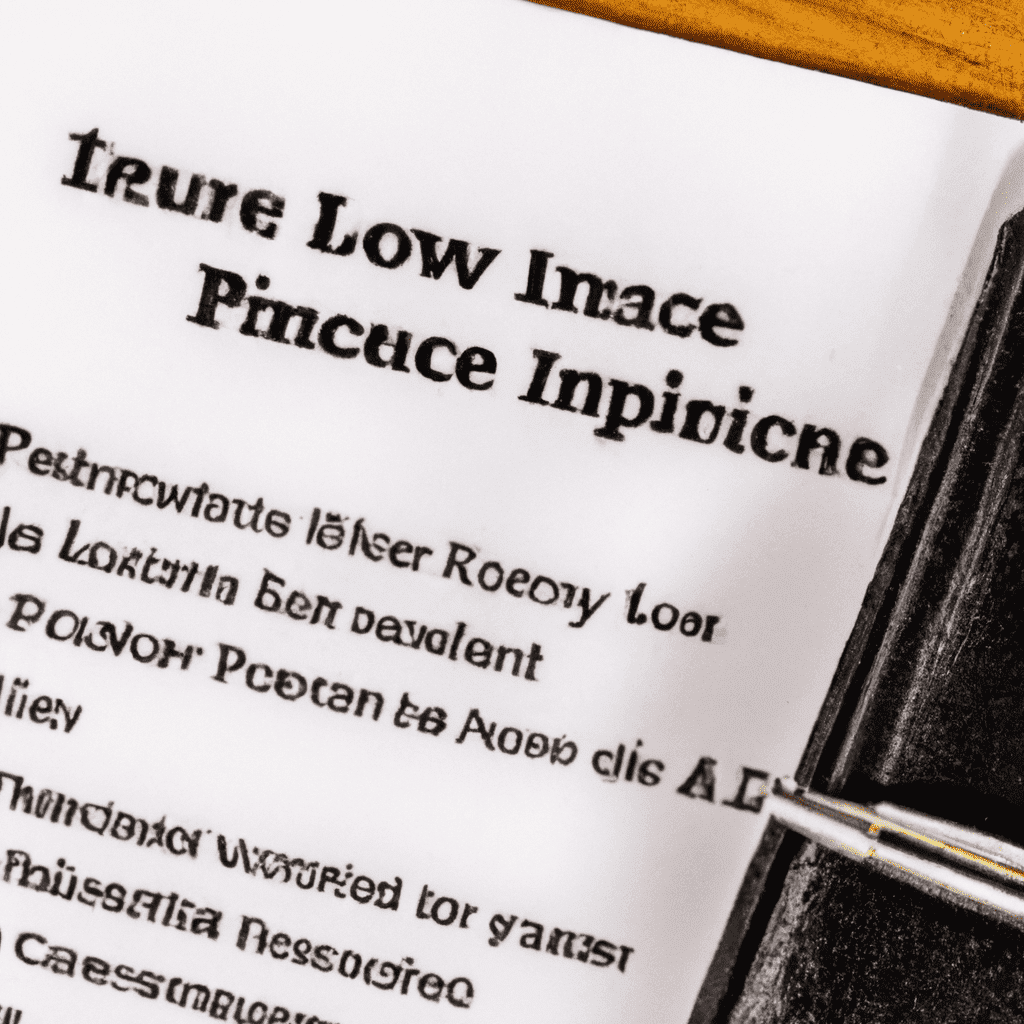As unfortunate as it is, accidents can occur in any shape or form, ranging from mild to catastrophic. When a person experiences a personal injury, they may find themselves struggling to recover and heal, while also dealing with losses such as lost income. It can be difficult to determine how much you have lost as a result of an accident, and it’s important to figure out the proper ways you can prove this kind of loss in court. This article will provide an overview of “How can you prove loss of income after a personal injury”, and discuss the various types of evidence that can help make your case.[[1](https://www.lawyers.com/legal-info/personal-injury/introduction-to-personal-injury-law/what-is-loss-of-enjoyment-in-a-personal-injury-case.html),[2](https://www.nolo.com/legal-encyclopedia/how-do-i-prove-future-lost-earnings-in-a-personal-injury-case.html),[3](https://jnylaw.com/how-can-you-prove-loss-of-income-after-a-personal-injury/)] In particular, you will learn how to prove income loss resulting from disability or wrongful death, calculate your compensation, and explain to the court the various effects the accident has had on your life. With this knowledge, you will hopefully be able to fight your case and receive the compensation you deserve after an accident.
Table of Contents
- 1. Overview of Proving Loss of Income in a Personal Injury Claim
- 2. How to Assess Lost Wages
- 3. Identifying Other Losses That Qualify for Personal Injury Claims
- 4. Reducing the Risk of Fraudulent Injury Claims
- Q&A
1. Overview of Proving Loss of Income in a Personal Injury Claim
Loss of Income
For personal injury attorneys, proving a client’s loss of income and wages is a critical part of a successful claim. An injured plaintiff may be eligible for compensation for past, present, and future lost wages, depending on the circumstances. To make a strong case, attorneys must demonstrate the financial impact of the injury and losses incurred, as well as the costs associated with rehabilitation and medical expenses.
To prove the amount of damages for loss of wages, attorneys must generally provide evidence such as pay stubs and earnings records. Additionally, the kind of evidence required will vary by state, as not all states follow the same types of documentation. To solidify the amount of lost wages, expert testimony may be beneficial, particularly from an economist or someone who is well-versed in financial matters.
- Documents such as pay stubs, tax returns, and wage statements may help prove loss of income.
- Expert testimony from economists or financial professionals may prove useful in certain cases.
- Compensation from a successful claim may include past and future losses, as well as damages for medical and rehabilitation costs.
References:
[[1](https://lawrank.com/25-content-marketing-ideas-for-personal-injury-lawyers/)] [[2](https://www.litify.com/resources/personal-injury-marketing)] [[3](https://www.scorpion.co/articles/verticals/personal-injury/5-content-ideas-for-your-personal-injury-law-fir/)]
2. How to Assess Lost Wages
One common way to assess lost wages is through the examination of the individual’s financial situation before their employment was interrupted. This involves establishing the individual’s income and their ability to gain employment at the same level of income or higher. This can include the individual’s past earnings in the same type of job, job history, educational experience, and other relevant measures of the individual’s earning potential. As well, an assessment of the individual’s current employment prospects or chances for gainful employment should be taken into account.
Additionally, it may be beneficial to consult with experts in the field. For instance, the OECD’s PISA Test may be useful in determining the individual’s likely earning potential. Similarly, the Clinical Practice Guidelines for Assessment of Children can be consulted to assess the individual’s earning potential and occupation-readiness. Furthermore, the ERIC document can provide valuable information regarding the current state of the job market in the individual’s area.
In conclusion, lost wages should be determined by assessing the individual’s financial situation before their employment was interrupted, consulting with experts, and referencing the current state of the job market. The below considerations may be used to identify lost wages:
- Past Earnings in the same type of job.
- Job History.
- Educational Experience.
- Ability to gain employment at the same level of income or higher.
- Current Employment Prospects.
- Job Market in the individual’s area.
- Occupation-readiness.
3. Identifying Other Losses That Qualify for Personal Injury Claims
In a typical personal injury claim, besides physical pain and suffering, there are other losses you may be able to claim. Depending on the circumstances, these could include loss of income, expenses for medical treatments, and other expenses. [[1](https://www.injuryclaimcoach.com/claim-letter.html)]
- Loss of Income
If you have had to take time off work or have been laid off due to your injury, you can file a claim for lost income. You need to provide proof of earnings by getting a pay stub or bank statement; if self-employed, you may use your tax return or certified financial statements. - Medical Expenses
These include expenses directly related to your injury or medical treatment including doctor’s visits, medications, and diagnostic tests. If you need personal health equipment due to injury you may be able to claim that too. [[2](https://www.ncbi.nlm.nih.gov/books/NBK519065/)] - Miscellaneous Expenses
These include expenses for physical or cognitive therapy, transportation, home help or childcare, and more. If your injury has altered your lifestyle it is important that you get the assistance you need, and you may be able to claim for assistance costs.
When writing your personal injury claim, make sure to include all relevant losses and use [[3](https://www.w3.org/TR/html401/present/styles.html)] to style the letter, such as adding bold and lists, to make it easier to read and understand.
4. Reducing the Risk of Fraudulent Injury Claims
Filing a Personal Injury Lawsuit
The best way to reduce the risk of encountering fraudulent injury claims is to demonstrate knowledge of the law and sheer confidence in the legitimate existence of the injury. Preparation is key when pursuing a claim. Knowing the basics of filing a personal injury lawsuit will help you build a solid case.
Before filing a lawsuit it is important to obtain and document evidence of the injury. Such evidence could be an accident report, medical bills and records, documentation of health care professionals and their testimonies, employment information such as lost wages, photographs, and personal accounts from witnesses as well as the plaintiff. Having evidence showing the behavior of the defendant also helps build a stronger case.
Ways to Protect Yourself
Aside from presenting a strong legal case, there are several other ways to protect oneself from fraudulent personal injury claims:
- Insurance: Invest in high quality, reliable insurance to ensure that, should an accident occur, you are covered for expenses such as medical bills, property damage, and legal fees.
- Documentation: Keep track of all conversations with the plaintiff, including written statements, emails, and record phone conversations.
- Respond to Claims: Refrain from responding to any potential fraudulent claims until consulting with legal counsel.
- Verify Source: Whenever possible, double-check the validity of a claim or the veracity of the source.
- Report Fraud: If a claim seems suspicious, report the potential fraudulent claim immediately to the authorities.
Ultimately, with the proper precautions, it is possible to reduce the risk of fraudulent injury claims. Since it is oftentimes difficult to prove fraud, it is important to have substantial evidence documentation and proper legal counsel when necessary.
Q&A
Q: What is lost income?
A: Lost income is the monetary value of wages that are lost due to an injury. This can include any wages or salary, compensation, bonuses, or other financial income that would have been earned, but cannot be received due to the injury. [[1](https://www.dlgteam.com/blog/personal-injury/calculating-lost-income-in-personal-injury/)]
Q: How is lost income valued?
A: Lost income is calculated based on the amount of work missed due to the injury. This can include lost hours, days, or weeks that affected the individual’s ability to work. Financial compensation is then determined based on the amount of work missed as well as the individual’s wages or salary prior to the injury. [[2](https://www.physiciansmutual.com/)]
Q: How can you prove loss of income after a personal injury?
A: One of the most important pieces of evidence to include in a personal injury claim is proof of wages or financial income being lost due to the injury. This could include paystubs, tax records, or letters from an employer or other source of income. Additionally, any medical bills, evidence of financial losses due to medical treatment, and proof of future or ongoing financial losses associated with the injury should be included in the claim. [[3](https://web.mit.edu/~ecprice/Public/wordlist.ranked)]
At the end of the day, it’s important to understand that there are options for getting compensation for lost earnings from a personal injury, provided one has the necessary evidence to back it up. It’s essential to provide a comprehensive breakdown of exactly what income was lost as a result of the injury, and to outline why the amount in question is reasonably proportional and won’t invite further disputes. For more information, see [[1](https://www.un.org/sustainabledevelopment/health/)], [[2](https://www.nolo.com/legal-encyclopedia/how-do-i-prove-future-lost-earnings-in-a-personal-injury-case.html)] and [[3](https://www.alllaw.com/articles/nolo/personal-injury/lost-income-damages.html)]. Taking the steps to document any lost income due to a personal injury can be time consuming, but it may be the best solution for getting the appropriate compensation.
personal injury lawyer oklahoma
oklahoma personal injury lawyer




